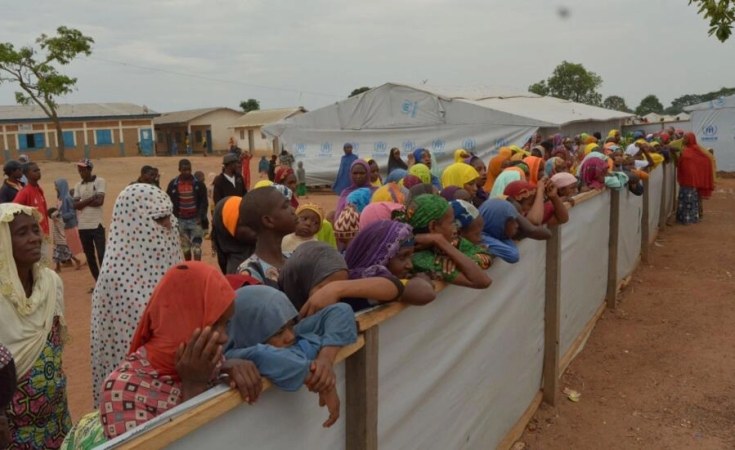Of the 300,000 refugees who have fled to Cameroon from the Central African Republic, most arrived with painful memories of their lives in the CAR. But displacement has added to their trauma, say those living in the Gado-Badgere refugee camp. Rife sexual violence and poor living conditions have left many weighing up whether they should return home.
Ndoti-Djo Ismail, one refugee in Cameroon, said his four young daughters were raped by armed men in the CAR.
"When my children finally joined me here, they were frail," Ismail told RFI. "It was sad, very sad."
Following decades of instability, conflict in the CAR exploded once again in 2013 following the overthrow of president Francois Bozize by Muslim Seleka rebels.
Since then, the government has struggled to exercise authority outside of Bangui, the capital, with retaliatory violence between rebels and anti-Balaka, a Christian youth militia.
The fighting has forced millions to flee and take refuge in neighbouring Cameroon, Chad and the Democratic Republic of Congo.
"I was raped and my daughter was raped," says Rahamadou Bidem, who fled to Cameroon seven years ago after witnessing her husband's murder.
"How do you ever forget that?" she said.
Offering a lifeline
Gado-Badgere village chief Martin Azia Sodea has welcomed thousands of refugees.
The retired gendarmerie officer, experienced in UN peacekeeping missions, has provided an area of 60 square kilometres with UNHCR-supplied tents.
The area accommodates almost 10 percent of refugees that fled the CAR to Cameroon - around 26,000 people.
Sodea has also offered farming spaces to produce food and other structures for social cohesion.
"These are people who might have lost everything, people who are suffering," Sodea told RFI.
"We even have a football team made up of refugees and our youths. They play together, and that has given us a sense that we are one big family."
Saoudatou Bah Mansare, head of UNHCR in Bertoua, says Sodea's approach is "salutary".
"We would love to see it replicated in other contexts where there are refugees and budgets are running thin," she said.
Camp life
But the camp in eastern Cameroon has not necessarily improved the lives of CAR refugees.
Bidem said access to essential services has reduced as funding from NGOs runs thin.
"It is difficult to get food and to get healthcare when you are sick. When it rains, we can't sleep because everywhere gets soaked," Bidem said of the conditions in Gado-Badgere.
She said fights over water, food and land frequently break out, often resulting in gendered violence.
"If you go in search of water, food or firewood, you could be attacked, beaten or raped. If you get pregnant, nobody accepts responsibility," she told RFI.
Her teenage daughter is now the mother of three children, all a result of rape.
"[They] all denied they raped and impregnated her, and I have the added burden of catering for the kids," Bidem said.
Voluntary return
On 6 March, nearly 300 refugees living in Gado-Badgere returned to the CAR. A similar number left other areas, with a total of 600 leaving Cameroon in that day alone.
A larger planned repatriation group of 2,500 was departing between March and April, according to Mansare.
"It is wholly voluntary. If at any one time any of the refugees opts not to return for whatever reason, they cannot be forced," she said.
Ismail, a former CAR politician facing fatal threats from his opponents, said he cannot return to his home country.
"I still have my children to take care of. It's better to be alive in hardship than die in search of comfort," he said.
Likewise, Bidem plans to stay.
She told RFI: "If I were to go back, where do I start? My husband killed, our property destroyed, where do you begin? I can't return. It will only revive old wounds."
Sodea said he feels hurt seeing refugees leave.
"Some of them have gotten married to our people and they have children. It is very difficult and sad to go this way," he said.


